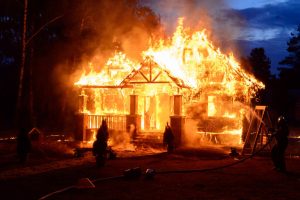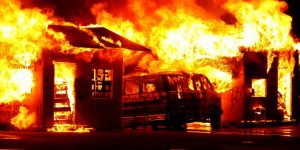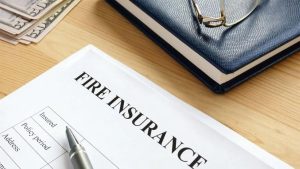Homeowners living in regions susceptible to wildfires may struggle to find coverage, but shopping around, lowering the risk, and speaking with an independent agent may help in finding coverage.
Most homeowners and business proprietors receive coverage for fire damage as part of their homeowners’, business, or automobile policies, with some having to purchase stand-in fire policies. Such policies often cover such things as:
1. Fire Damage Coverage
Regardless of your residing region, possessing fire insurance can guarantee protection for both your home and property, without accruing excess expenditure. Fire damage is considered a peril in most homeowner insurance policies, however, other policies have more coverage such as damage due to burglary or break-in and falling objects (such as tree limbs).
Standard policies offer reimbursement for damages in the form of either actual cash value, which includes depreciation or replacement cash value which provides full reimbursement for what the items were valued at prior to being damaged by fire or smoke. Some valuables such as money, coins or personal records come with low limits or are excluded completely, hence it’s essential to have an inventory list and take note of what you cherish the most to protect them.
A lot of home insurance policies include loss of use coverage, which covers accommodations when the home becomes uninhabitable after a fire. Coverage usually includes hotel fees, added gas expenses for work commutes, laundry and meal takeout services – which combined usually are capped at 20% of the dwelling coverage limit.
2. Use Coverage Loss
Homeowners insurance also covers loss of use, or additional living expenses coverage (ALE). If your property is rendered uninhabitable due to fire damage, this will cover the expenses incurred from living elsewhere; which include, but are not limited to, restaurant meals, hotel stays, and increased gas expenses for commuting. Most homeowners policies have this provision, but some do not – consult with an independent agent to know more about their particular policies.
If you run a business, think about protecting it with fire insurance as well for more extensive coverage. General liability can protect you from third party claims, and commercial property protection covers your physical assets. Or you can purchase a Business Owners Policy, which is more affordable because it combines both coverages in one.
If you are considering raising the amount of coverage you have, it is important to routinely check the limits and deductibles of your policies. Discuss any additional costs with your agent, or fill out out free online form now to get quotes from several providers!
3. Extra Living Expenses Protection
Homeowners that have home-fire insurance policies usually cover the cost for food, transportation and temporary lodging while the house is being worked on or rebuilt. Certain policies may even go so far as to cover necessary expenses including laundry services, pet boarding, or furniture storage for rebuilt houses, which come with receipts.
Commercial property and business interruption insurance can be purchased by businesses to cover lost revenue if a fire results in the destruction of equipment and has the business closing it’s doors. With Insureon’s simple online application, businesses are able to easily compare policies from leading U.S. insurers, and purchase them within a day.
In addition to existing homeowner insurance policies, dwelling fire insurance could be purchased to provide further coverage to existing policies and older homes situated in high-risk locations. While offering the coverage of limited perils, full replacement cost and fair value is usually omitted from being included; however, some insurers do offer policies that include comprehensive coverage. In addition, there may also be personal liability coverage for detached structures like sheds and fences, which can be enhanced to more protective actual loss sustained coverage.
4. Personal Property Coverage
The destruction of belongings as a result of fire damage is covered by personal property coverage otherwise known as contents coverage on home insurance policies. It is crucial that you know the types of items covered under different limits and their relevance so you can reclaim or replace your possessions with less hassle after an unexpected event – tools, silverware, and rugs can be replaced with standard coverage but additional coverage might be required for furs, jewelry, and electronics.
The average home policy lets you claim up to a fifth of your personal property limit for belongings. If you think this is not enough to protect the belongings within your house, an independent insurance agent can assist you. They can also clarify loss of use coverage, which helps cover motel stays, meal expenses, and gas incurred from having to relocate temporarily while your house is under restoration due to fire damages.
Some homeowners live in wildfire prone areas and may need special fire insurance policies or plans designed specifically to address them. Some companies will tailor these plans to residents most at risk or suggest risk mitigation strategies such as fireproof roof tile installation or the construction of defensible spaces around their homes.
5. Additional Structures Coverage
Also known as Coverage B, other structures coverage in home insurance policies is meant to protect the detached outbuildings on your property like sheds and garages from fire damage. By default, other structures coverage includes 10% of your dwelling coverage as default limit; however, as budgetary constraints allow, consider additional protective policies if more structures need guarding.
You are likely to be covered for your contents under a basic household policy, however, in the event of a fire hazard or your dwelling being located at a distance from the nearest fire station, you may need further cover. In such cases, additional cover may be found under the Fair Access to Insurance Requirements plans.
The majority of stand-alone home, business, and auto policies tend to incorporate fire as one of the perils under their coverage. If, however, you feel that your current policies do not extend enough to cover your needs, then you would need to talk to an independent agent who would be in a better position to address your requirements.




